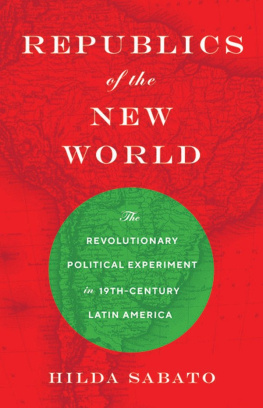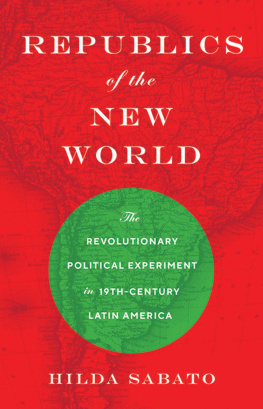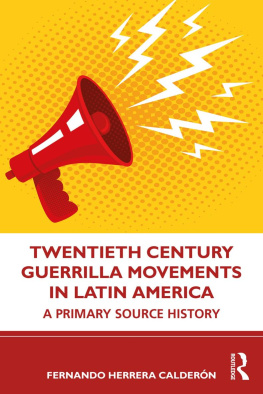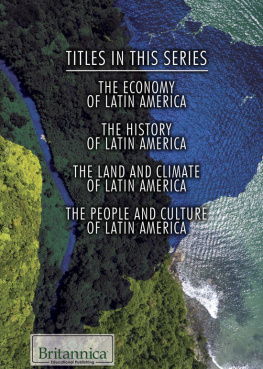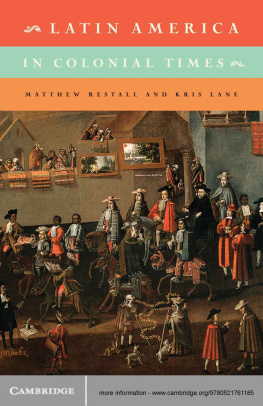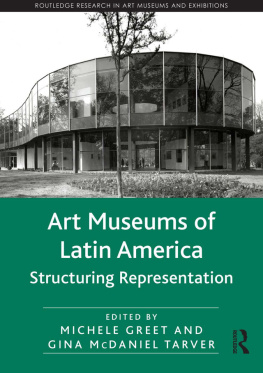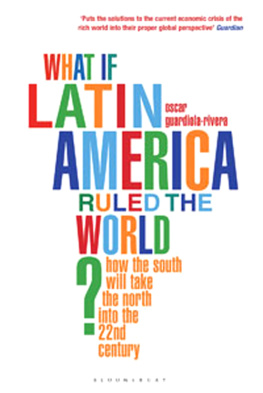Hilda Sabato - Republics of the New World: The Revolutionary Political Experiment in Nineteenth-Century Latin America
Here you can read online Hilda Sabato - Republics of the New World: The Revolutionary Political Experiment in Nineteenth-Century Latin America full text of the book (entire story) in english for free. Download pdf and epub, get meaning, cover and reviews about this ebook. year: 2018, publisher: Princeton University Press, genre: Politics. Description of the work, (preface) as well as reviews are available. Best literature library LitArk.com created for fans of good reading and offers a wide selection of genres:
Romance novel
Science fiction
Adventure
Detective
Science
History
Home and family
Prose
Art
Politics
Computer
Non-fiction
Religion
Business
Children
Humor
Choose a favorite category and find really read worthwhile books. Enjoy immersion in the world of imagination, feel the emotions of the characters or learn something new for yourself, make an fascinating discovery.
- Book:Republics of the New World: The Revolutionary Political Experiment in Nineteenth-Century Latin America
- Author:
- Publisher:Princeton University Press
- Genre:
- Year:2018
- Rating:5 / 5
- Favourites:Add to favourites
- Your mark:
- 100
- 1
- 2
- 3
- 4
- 5
Republics of the New World: The Revolutionary Political Experiment in Nineteenth-Century Latin America: summary, description and annotation
We offer to read an annotation, description, summary or preface (depends on what the author of the book "Republics of the New World: The Revolutionary Political Experiment in Nineteenth-Century Latin America" wrote himself). If you haven't found the necessary information about the book — write in the comments, we will try to find it.
Hilda Sabato: author's other books
Who wrote Republics of the New World: The Revolutionary Political Experiment in Nineteenth-Century Latin America? Find out the surname, the name of the author of the book and a list of all author's works by series.
Republics of the New World: The Revolutionary Political Experiment in Nineteenth-Century Latin America — read online for free the complete book (whole text) full work
Below is the text of the book, divided by pages. System saving the place of the last page read, allows you to conveniently read the book "Republics of the New World: The Revolutionary Political Experiment in Nineteenth-Century Latin America" online for free, without having to search again every time where you left off. Put a bookmark, and you can go to the page where you finished reading at any time.
Font size:
Interval:
Bookmark:
REPUBLICS OF THE NEW WORLD
Republics of the New World
THE REVOLUTIONARY POLITICAL EXPERIMENT IN NINETEENTH-CENTURY LATIN AMERICA

Hilda Sabato
PRINCETON UNIVERSITY PRESS
PRINCETON & OXFORD
Copyright 2018 by Princeton University Press
Published by Princeton University Press,
41 William Street, Princeton, New Jersey 08540
In the United Kingdom: Princeton University Press,
6 Oxford Street, Woodstock, Oxfordshire OX20 1TR
press.princeton.edu
Jacket image: South America. Lionel Pincus and Princess Firyal Map Division, The New York Public Library. New York Public Library Digital Collections.
All Rights Reserved
Library of Congress Control Number 2017954508
ISBN 978-0-691-16144-0
British Library Cataloging-in-Publication Data is available
This book has been composed in Miller
Printed on acid-free paper.
Printed in the United States of America
10 9 8 7 6 5 4 3 2 1
Para Julin y Andrs
CONTENTS
ACKNOWLEDGMENTS
MANY YEARS AGO, when I began to work on nineteenth-century Argentine politics, I soon realized that it was hard to think of the problems I faced without considering them as part of the larger history of the demise of the Spanish empire and the formation of the Latin American republics. From then on, my specific studies on Argentina were informed by that process and by its rich historiography, as well as by the debates on republicanism and political modernity beyond our region. Soon, and somewhat on the side of my focalized research, I started to delve more systematically into that history, until it caught my whole attention and finally inspired this book. This is a long story for a rather short essay, but it took time to come about and along the way I contracted innumerable intellectual debts, so many that any efforts on my part to do them justice will surely prove lacking. Let me try, nevertheless, to acknowledge those more directly connected with the writing of this book.
In my attempts to go beyond my limited field of expertise, I sought the aid and advice of colleagues who generously provided me with ideas, suggestions, and critical comments, as well as with specific references to published and unpublished works. My special thanks to Vctor Hugo Acua, Jos Antonio Aguilar Rivera, Cristbal Aljovn, Alfredo vila, Catalina Banko, Rossana Barragn, Ana Frega, Pilar Gonzlez Bernaldo, Nils Jacobsen, Annick Lemperire, Carmen McEvoy, Cecilia Mndez, Luis Ortega, Juan Luis Ossa, Marco Pamplona, Erika Pani, Eduardo Posada Carb, Natalia Sobrevilla, and Ana Mara Stuven.
But it was only through my years-long ongoing intellectual dialogue with friends and colleagues at home that I could conceive of and develop the main arguments of this book. I am particularly indebted to Natalio Botana, Paula Alonso, Beatriz Bragoni, Gabriel Entn, Noem Goldman, Juan Carlos Korol, Eduardo Mguez, Elas Palti, Juan Carlos Torre, and Eduardo Zimmermann, as well as the members of our current seminar group at the University of Buenos AiresLaura Cucchi, Leonardo Hirsch, Flavia Macas, Mara Jos Navajas, Ins Rojkind, Ana Romero, Jimena Tcherbbis Testa, Nahuel Victorero, and Ignacio Zubizarreta. With Marcela Ternavasio, we have spent long hours sharing questions and concerns regarding the present and the past, including among them most of the issues raised by this book. I thank her for her support and encouragement as well as for her sharp comments to the original manuscript. Above all, I remain forever in debt to Tulio Halperin Donghi, who inspired so many of my questions on Latin American history.
Crucial inputs to my work also came from discussion in seminars where I presented some the main arguments later developed here, at the following institutions: Universit de Paris I, Emory University, the University of Georgia, Universidade de So Paulo, Foro Iberoideas, Pontificia Universidade Catlica do Rio de Janeiro, 3 Congresso Internacional do PRONEX (Rio de Janeiro), the Davis Seminar at Princeton University, the Annenberg Seminar at the University of Pennsylvania, University of South Carolina, Freie Universitt Berlin, and Universitt Leipzig. My thanks to all those who participated in those sessions for their insights and comments, particularly to Jeremy Adelman, Tom Bender, Roberto Brea, Vera Candiani, Miguel Centeno, Oscar Chamosa, Roger Chartier, Linda Colley, Jos Murilo de Carvalho, Arcadio Daz Quiones, Miriam Dolhnikoff, Don Doyle, Antonio Feros, Paul Friedland, Barbara Gbel, Jrgen Kocka, Carlos Marichal, Stephanie McCurry, Hans-Jrgen Puhle, Bernardo Ricupero, Michael Riekenberg, Stefan Rinke, Daniel Rodgers, and Stanley Stein. My special thanks to Jeremy Adelman and Linda Colley who encouraged me to develop my sketchy manuscript into a full-fledged book and to Brigitta van Rheinberg, of Princeton University Press, who showed confidence in that possibility and subtly guided me in the ensuing process. The anonymous readers of PUP provided very useful suggestions and comments that helped me improve the original version.
I worked on this book in Buenos Aires and Cortaderas (Argentina) as well as in Berlin and Princeton. My gratitude to the institutions that supported me in this endeavor: the Programa de Estudios de Historia Econmica y Social Americana (PEHESA) of the Instituto Ravignani, which belongs jointly to the University of Buenos Aires and CONICET; the Davis Center at the History Department of Princeton University; and the Lateinamerika-Institut at the Freie Universitt Berlin. Also, to the librarians and archivists who kindly helped me in my searches through the three libraries that proved invaluable for my work: Firestone in Princeton, the Iberoamerikanische Institut in Berlin, and the library at the Instituto Ravignani in Buenos Aires. Federico Garca Blaya, in turn, assisted me with great efficiency in the collection and processing of information. In the course of my research, I received decisive financial support through grants from the University of Buenos Aires, CONICET, and the Agencia Nacional para la Promocin Cientfica y Tecnolgica in Argentina, as well as through a Davis Center fellowship at Princeton University and the Humboldt Forschungspreis granted in 2012 by the Humboldt Stiftung in Germany.
In dedicating this book to my sons, Julin and Andrs Reboratti, I wish to express my deepest appreciation for the love and support I receive from them, as well as from their spouses, Loli and Nadia, and my endearing granddaughters Renata, Antonia, and Juana. Most of all, I thank Charly, my husband, for his good humor, his patience, and his loving care.
REPUBLICS OF THE NEW WORLD
Introduction
A GREAT POLITICAL commotion marked the beginning of the nineteenth century across the Spanish empire. Napoleons occupation of the Iberian Peninsula shattered imperial unity and inaugurated a long history of political change on both sides of the Atlantic. In the Americas, most of the former colonial territories entered into a period of reformulation of the colonial links that ended in independence, followed by a vast, lengthy, and intricate process of redefinition of sovereignties and formation of new polities. Attempts at nation building followed different directions, and many a project was tried and failed, while no linear or predetermined path led to the fifteen individual nation-states in place by the end of the second half of that century.
There was, however, a common denominator to that complex process: the polities in the making, the short- and the long-lived alike, all adopted forms of government based on the principle of popular sovereignty. Spanish America was, therefore, part of the larger history that involved the English, the American, and the French revolutions, the foundation of constitutional monarchies, the invention of a federal republic in the United States and of other republican regimes in Europe, andabove allthe institution of the sovereignty of the people as a founding principle of the political. These developments shattered the edifice of the ancien rgime in various parts of the world where, from then on, the political no longer referred to a transcendent instance but was considered a human construct. The making of the Spanish American republics belongs to this broader picture. Until a short while ago, however, this experience remained marginal to the mainstream narratives of political modernity that revolved around the northern EuropeUnited States axis. By introducing Spanish America into this story of political transformation, this book joins the work of other scholars who, in recent years, have adopted a more global approach in order to widen the scope of those narratives.
Next pageFont size:
Interval:
Bookmark:
Similar books «Republics of the New World: The Revolutionary Political Experiment in Nineteenth-Century Latin America»
Look at similar books to Republics of the New World: The Revolutionary Political Experiment in Nineteenth-Century Latin America. We have selected literature similar in name and meaning in the hope of providing readers with more options to find new, interesting, not yet read works.
Discussion, reviews of the book Republics of the New World: The Revolutionary Political Experiment in Nineteenth-Century Latin America and just readers' own opinions. Leave your comments, write what you think about the work, its meaning or the main characters. Specify what exactly you liked and what you didn't like, and why you think so.

